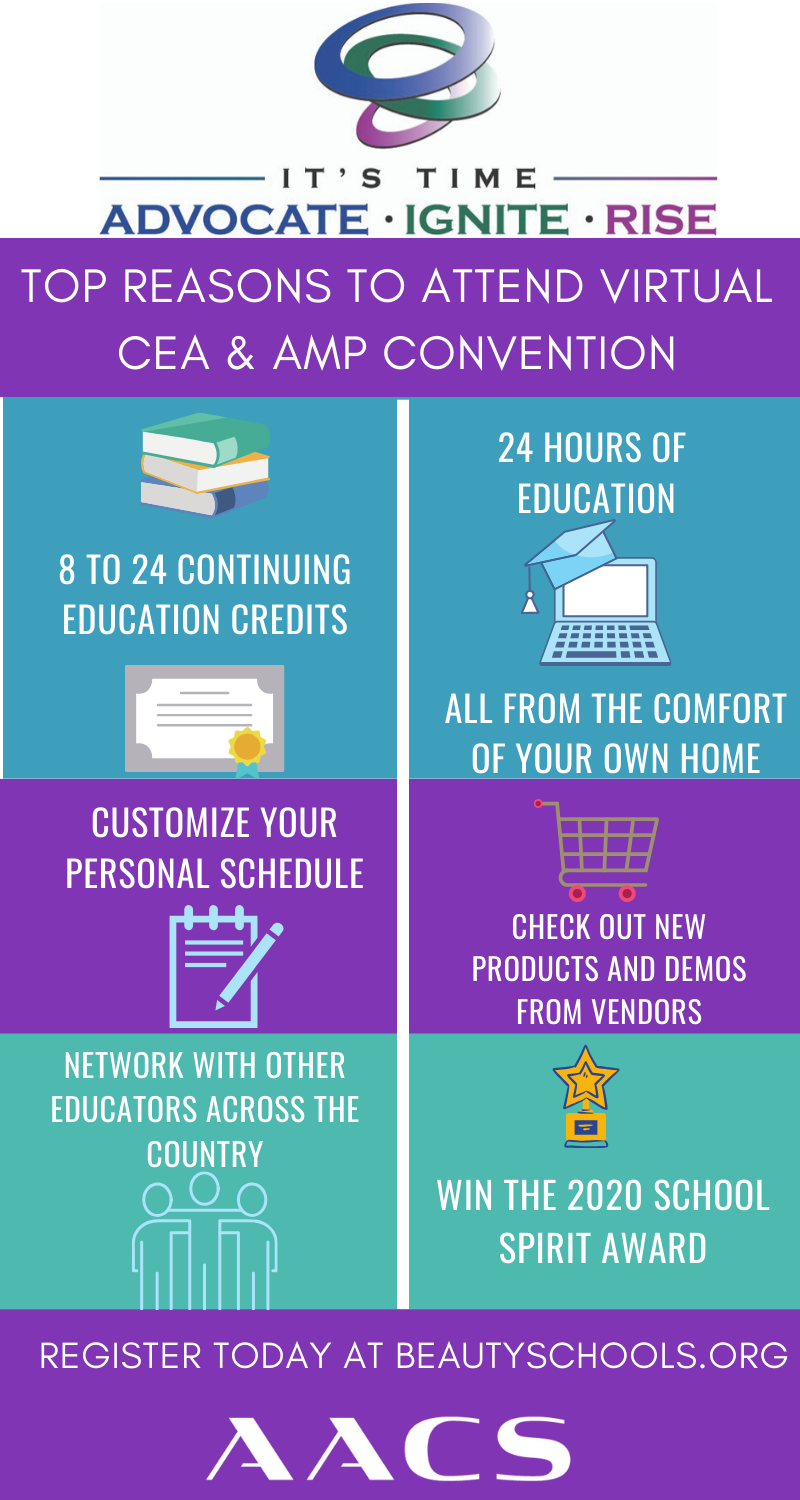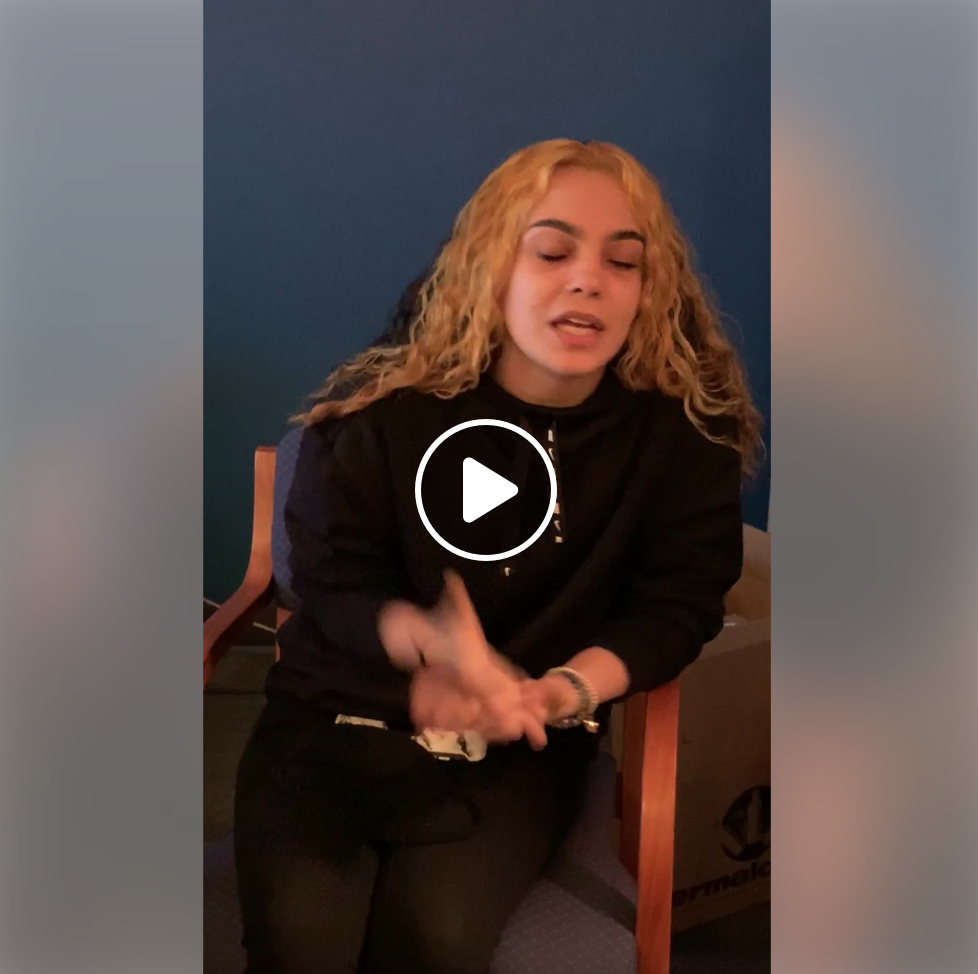 |
| Archive | Subscribe | Printer Friendly | Send to a Friend | www.beautyschools.org |
|
What's Hot
Two more days! 
Be part of history! Join the first ever virtual AACS CEA & AMP. Check out the schedule for this first-of-its-kind event here. Register to join us July 11-13, 2020. Click here for more information. VOTING ENDS IN TWO DAYS

Who will take home this trophy? The entries are in and now it’s time for you to pick which school has the most school spirit! Each video should be judged on the following criteria:
Voting ends July 11. Vote today!

Monica Seeley attends Cortiva Institute in Cromwell, CT. As you can hear in her video, Seeley has big dreams for herself and her daughter. “I am a hands-on learner, and this school is tailored to my needs. Without my financial aid, I’d be working a dead-end job for the rest of my life.” She wants U.S. Rep. John Larson, Senators Richard Blumenthal and Chris Murphy to hear her! You can encourage your students to record a short 30–60 second video that explains what their education means to them. Learn more about the #DontCutUsOut campaign here.

Reopening Guide States are adjusting their phased openings based on new information daily. Stay updated with AACS’ Reopening Guide to help your schools and organization proceed with protocols to ensure the safety and health of your staff, instructors, students, and community. In addition to resources, it also includes a state-by-state list of reopening policies. Click on this link to find out more. Coronavirus Resource Center AACS is here for you with a comprehensive coronavirus resource page that will be updated as new information comes in. Click here for updates from the Centers for Disease Control, World Health Organization, Small Business Administration, U.S. Department of Education, accreditors, distance learning educators and more.
One week left: 2020 AACS Board nominations Serving as a Director is one of the most important ways that you can support and sustain AACS. Our Directors have the responsibility to provide foresight, oversight, and insight for the Association. They serve as our primary ambassadors, advocates and the conscious voice of our Members. Our Board of Directors should reflect the highest aspirations of our businesses, our students and our industry.
If you are interested in serving, complete this Board Nomination Application Form and send to Jim Petrillo, vice chair of the AACS Governance Committee. This short PowerPoint addresses a few frequently asked questions. Member Benefits
The term “Competency-Based Instruction” (CBI) is emerging as a new and preferred approach to education and the management of education. CBI is currently being evaluated at all levels of education, from K-12 to higher education and beyond. In traditional higher education it is referred to as CBE (Competency-Based Education) as it relates to specific competency-based programs. This course explores the topic in terms of the various characteristics of competency-based teaching and learning and highlights the most commonly agreed-upon benefits for students.
Preparing to reopen your school? Office Depot - OfficeMax member can help In addition to safety and health protocols, additional supplies will likely be needed to protect your instructors, staff and students as the learning continues. For a limited time, for AACS members only, cloth masks and face shields are available (supplies are limited).
Masks are available by calling Nicole Gutierrez at: (855) 337-6811 ext. 12673 or Sara Haltom at (855) 337-6811 ext. 12872. Whether working from home or back in your offices, OfficeMax is here to provide AACS members special benefits. Businesses using the Office Depot discount program see significant savings. Take advantage of the program today and you could save thousands of dollars per year! To learn more, click here. Especially during this time of the coronavirus pandemic, we have been hosting webinars for members to provide the latest information to help you continue to serve your students and manage your business. If you missed a webinar, recordings are available to members only. Webinars to date are:
If you would like the recording, email info@beautyschools.org. More will be available soon. Monitor your inbox for the latest information. Additional FAQs are available regarding:
GRC News
Federal Legislative Weekly Update Congress July 7, 2020 – The House Labor, Health and Human Services, Education, and Related Agencies (Labor-H) Appropriations Subcommittee advanced its FY 2021 spending bill. The measure was sent to the full committee on a party-line vote of 9-6. The bill provides a total of $73.5 billion in discretionary appropriations for the Education Department, an increase of $716 million above the FY 2020 enacted level and $6.9 billion above the President’s budget request. Of this amount, the bill includes:
The bill also includes a number of policy riders:
June 30, 2020 – Senate Democrats released their ‘‘Coronavirus Child Care and Education Relief Act’’ bill that includes $430 billion for child care, K-12 schools and higher education. Introduced by Sen. Patty Murray (D-WA) and Minority Leader Chuck Schumer (D- NY), the bill includes $132 billion in additional relief for higher education institutions, with more flexible uses of funds. The allocation for section 102 institutions (proprietary) that are not primarily online (as of March) was limited to only 1.5% of the whole pot and excluded them from the larger pot. The legislation also adds language that would treat all CARES Act funds as Title IV for 90/10 purposes. U.S. Department of Education July 7, 2020 – The Department published a notice in the Federal Register requesting approval of an information collection which solicits applications for Education Stabilization Fund—Reimagine Workforce Preparation Grants (ESF-RWP), which is authorized by section 18001(a)(3) of Division B of the Coronavirus Aid, Relief, and Economic Security Act (CARES Act). The collection request includes a notice inviting applications and an accompanying application package. These documents set out the selection criteria used to assess the quality of applications and establish application requirements and the performance indicators on which grantees must report. This discretionary grant falls under the Streamlined Clearance Process for Discretionary Grant Information Collections, 1894-0001. July 6, 2020 – The Student and Exchange Visitor Program (SEVP), a branch of the Immigration and Customs Enforcement (ICE) agency, charged with regulating universities that admit foreign students, issued guidance for the fall 2020 semester. This new guidance forbids universities from issuing I-20s, mandatory F-1 paperwork, to returning or transfer students and to new students if their programs for the fall 2020 semester will be 100% remote. It also forbids U.S. consulates from issuing F-1 Student visas to these same students, and Customs and Border Protection (CBP) from allowing them to enter our land borders. SEVP has also made clear that F-1 students currently in the United States, who were planning to attend 100% remote programs for the Fall 2020 semester, must either transfer to a hybrid or in-person program, depart from the United States or face removal proceedings in immigration court. For additional information, see the Duane Morris Client Alert. July 1, 2020 – Several new regulations went into effect on July 1, including rules on accreditation and state authorization reform. The Department's Accreditation and State Authorization regulations expand educational options for students, protect schools with religious missions, lower accreditation costs borne by institutions of higher education, clarify an institution's responsibility for determining where a student resides and what distance learning rules impact that student, and ensure occupationally-focused education meets current workforce needs. For additional information, see the Duane Morris Client Alert. U.S. Secretary of Education Betsy DeVos announced the Department of Education has approved the final wave of career and technical education (CTE) plans under the bipartisan Strengthening Career and Technical Education for the 21st Century Act (Perkins V), which was signed into law by President Donald J. Trump on July 31, 2018. Alaska, Connecticut, New Jersey, New Mexico, North Carolina, and West Virginia are the latest states, along with Puerto Rico, to have their CTE plans approved. Nine additional states combined their CTE plans with their Workforce Innovation and Opportunities Act (WIOA) plans which have also been approved: Alabama, Delaware, Indiana, Minnesota, Ohio, Pennsylvania, Rhode Island, Virginia, and Washington. June 30, 2020 – As part of her continuing charge to state and local education leaders to rethink school, U.S. Secretary of Education Betsy DeVos announced a challenge to advance high-quality technology instruction in rural communities. The Rural Tech Project, with a total cash prize pool of $600,000, invites high schools and local educational agencies (LEAs) to develop competency-based distance learning programs that enable students to master skills at their own pace with the goal of preparing them for the well-paying, in-demand jobs of today and tomorrow. Amid the coronavirus pandemic, schools across the country have had to grapple with how to successfully continue to educate students who are not physically in a classroom.
H.R.7497 – To establish a rural postsecondary and economic development grant program. H.R.7477 – To require the Secretary of Labor to establish a program to provide grants for job guarantee programs. H.R.7449 – To refinance Federal and private student loans, and for other purposes. H.R.7433 – To amend the Higher Education Act of 1965 to provide student loan deferment for dislocated military spouses, and for other purposes. H.R.7424 – To amend title 10, United States Code, to increase the amount which may be paid to members of the Selected Reserve under the education loan repayment program, and for other purposes. S.4141 – A bill to refinance Federal and private student loans, and for other purposes. S.4112 – A bill to support education and child care during the COVID-19 public health emergency, and for other purposes.
State Update Florida and Pennsylvania Bills Signed into Law The first full week of July finds only six state legislatures actively meeting. While state legislative activity is currently light, two bills of interest were signed into law the week before July 4th. The first measure – Florida HB 1193 – reduces the course of instruction for barbering from 1,200 to 900 hours. The second bill – Pennsylvania SB 637 – pertain to licensure for judicially involved individuals. As always, AACS will keep you apprised of the latest state legislative and regulatory developments of interest to member schools. Florida HB 1193 was signed into law by Governor Ron DeSantis (R) on Tuesday, June 30. In addition to the barbering hour reduction, the measure allow for early licensure testing of barbers at 600 hours; reduces the hours for specialist licensure; provide for 1-to-1 licensure reciprocity of barbers and cosmetologists; deregulate hair braiding, hair wrapping, body wrapping, the application of polish to fingernails and toenails, and makeup application, and; reduce the biennial CEU requirement for licensure renewal from 16 to 10 hours. The effective date of the bill is July 1, 2020. A day later on July 1st, Pennsylvania Governor Tom Wolf signed SB 637 into law. According to an official summary, the measure “allows the Boards of Barber Examiners and of Cosmetology to issue restricted licenses for not less than one nor more than 2 years to individuals with criminal convictions who exhibited good behavior while incarcerated, and successfully completed all rehabilitative programming and education and training requirements. The Boards of Barber Examiners and State Board of Cosmetology shall impose conditions on the holder of the restrictive license, including: i. Limiting the scope and location of the license holder practice; ii. Requiring the license holder to be reasonably supervised; and iii. Requiring the license holder to give notice to the Board if there is a change in supervisors. A restricted license shall be immediately revoked if the holder is convicted of a misdemeanor or felony or the holder fails to comply with any conditions. Within 30 days of the end of the term of the restricted license, the supervisor of the holder shall provide written notice to the applicable Board whether the restricted license holder complied with all conditions and if the license holder meets all qualifications. If the holder fulfills those actions, the Board must issue a full license.” The cosmetology related provisions in SB 637 are effective 180 days after enactment – roughly January 1, 2021. The text of the bills listed in this report can be found in AACS’ Bill Tracking Portal. Please do not hesitate to contact Brian Newman at bnewman@abingdonstrategies.com or by phone at 202-491-5254 with comments or questions. COVID-19 Resources This page contains a running list of state reopening guidance for salons and other personal care businesses. AACS Coronavirus Resource Center The bottom of this page contains a running list of state distance learning guidance. It was compiled with assistance from the AACS State Relations Committee and/or a review of state board websites. Accordingly, developments may be occurring faster than our ability to capture/report on them. Please contact your state regulator(s) for the most current information. State and Local Government Responses to Covid-19 Stateside Associates, a state and local government relations firm, has created a chart with state legislative actions, executive agency actions, gubernatorial actions, and local government actions related to the outbreak of the coronavirus. Executive actions closing retail and “non-essential” businesses will be of interest. PBA/Stateside Associates Report: Reopening of State and Local Economies (Updated July 2, 2020) National Governors Association Coronavirus Updates COVID-19 State Legislation – National Conference of State Legislatures |









